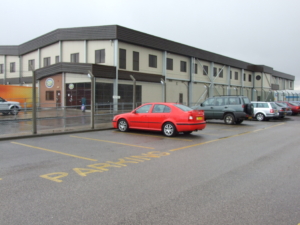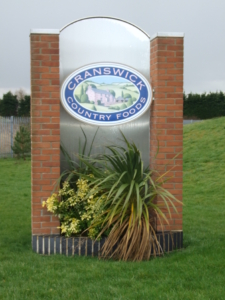 The company started very modestly in the early 1970s in Hutton Cranswick, near Driffield, East Yorkshire, England, as a feed mill producing three basic rations for the East Riding Quality Bacon Producers Group.
The company started very modestly in the early 1970s in Hutton Cranswick, near Driffield, East Yorkshire, England, as a feed mill producing three basic rations for the East Riding Quality Bacon Producers Group.
Now fast forward to 2018. Cranswick plc, which was floated on the stock market in 1985, is now a highly rated company in the FTSE 250 with revenues of £1245.1 million in 2017. The company has an uncanny ability of buying strong, growing businesses and investing in them to drive further growth; a proud boast of the company is that it has increased shareholder dividends every year for 27 years, something that very few other companies can match.
Adam Couch is Yorkshire born and bred, who joined the company as one of its first ever graduate employees and then gradually worked his way through the ranks and attained his present position as CEO in 2012.
“Cranswick has a three-pronged approach to its business,” commented Couch.
1. Consolidation – drive the core
2. Diversification – develop new market opportunities
3. Internationalisation – grow sales internationally
 Consolidation: “Pigs have been the mainstay of our business with our first abattoir being located in Preston near Hull and which has expanded considerably over the years. Back in the 1990’s we had our own pig farms but these were sold along with our feed business to BOCM (now ForFarmers) in 2003.”
Consolidation: “Pigs have been the mainstay of our business with our first abattoir being located in Preston near Hull and which has expanded considerably over the years. Back in the 1990’s we had our own pig farms but these were sold along with our feed business to BOCM (now ForFarmers) in 2003.”
In 2009, Cranswick acquired the family business of Bowes of Norfolk, which had a turnover of £75 million. This company had its own processing division plus Wayland Farms, which was acquired in 2013, and has a number of outdoor pig breeding and finishing operations. A £40 million investment in Bowes resulted in a new line being installed in 2016 and last year doubled the kill to 20,000 pigs per week. Another strategic acquisition took place in November 2016, when Cranswick purchased Dunbia’s Ballymena, County Antrim, N. Ireland, pork processing business. The business was slaughtering 8000 Assured pigs / week – this now has almost doubled and employs 360 people.
“This purchase has given us significant presence in Northern Ireland and of course increases our weekly pig  numbers and strengthens our UK pork processing business,” added Couch. As well as increasing the pig kill over the years, carcass weights have been steadily increasing. This gives the processor more pigmeat and is more economic at farm level too. “We will happily take entires up to 105kg deadweight. Taint is not a problem – we have no skatole or androstenone issues, as UK pigs have a very fast growth rate.” We are now seeing a lot more Duroc semen being used in the UK giving 50 per cent Duroc in the slaughter pig. Breeding companies extol the virtues of increased intra muscular fat improving taste and eating quality but the problem is how we pay for it as currently there’s no grading system in place, although the Americans are seriously looking at such a scheme.
numbers and strengthens our UK pork processing business,” added Couch. As well as increasing the pig kill over the years, carcass weights have been steadily increasing. This gives the processor more pigmeat and is more economic at farm level too. “We will happily take entires up to 105kg deadweight. Taint is not a problem – we have no skatole or androstenone issues, as UK pigs have a very fast growth rate.” We are now seeing a lot more Duroc semen being used in the UK giving 50 per cent Duroc in the slaughter pig. Breeding companies extol the virtues of increased intra muscular fat improving taste and eating quality but the problem is how we pay for it as currently there’s no grading system in place, although the Americans are seriously looking at such a scheme.
Cranswick is continually investing. A new site for Continental Foods is one such example, with a £28 million investment in Bury, Lancashire, to improve capability and generate extra capacity. Five million pounds has been spent on robotics to streamline the butchery process in our Preston processing plant using technology first developed by the Icelandic fish processing industry. A new range of slow cooked meals from Sutton Fields (Hull) has delivered significant commercial benefits for one of our key retailers. We then also have our premium pastry business which continues to grow and drive premium category pastry growth for M&S supermarkets.
Diversification:
Chicken is a very popular meat; pigs and poultry are very similar with both converting grain into protein and so it made sense for Cranswick to diversify and hence in 2014 the company acquired Hull – based Benson Park, a producer of premium cooked chicken products and employing 90 staff at the time of acquisition. Significantly the size of the business has doubled in the last three years with significant growth into retail packs of cooked chicken being a feature of this expansion. Then in April 2016, Cranswick paid £40 million to acquire Crown Chicken Ltd (CCL), based in East Anglia. Crown is a vertically integrated business, from milling its own feed, through to hatching its own eggs, through to processing its own birds. Food miles are the lowest in the industry with all farms being no more than an hour away from the company’s main processing site. A massive £70 million investment programme is under way, with £58 million being invested on a green field processing facility along with £12 million on improving the company infra structure.
Internationalisation
Another big success story relates to exports, in particular to China. Cranswick is the UK’s leading exporter of pork, shipping over 50 different product lines amounting to 1000 tons of product per week. It’s such an important market that Cranswick has established its own office in Shanghai. Cranswick has built a credible reputation in China with its own well known “Little House” brand. Pig’s heads are now shipped in it’s entire to China, along with the trotters and forelimbs neatly packed in boxes proudly bearing the company logo. Ironically the “moon bone,” a piece of cartilage at the end of the scapula, is a great delicacy for soups and is worth as much as pork loin in China.
In addition to China, pork products are also being exported to New Zealand, Australia, Korea, Japan and the USA, with the Sterling weakness benefiting this trade. “Baby ribs have been exported to the USA for many years, whilst having outdoor reared high welfare sourced pigmeat gives us an advantage over our competitors with regard to our Japanese export business,” stated Couch. “The company is very lucky to have Ed Wright as our export director. Ed travels thousands of miles boosting exports and does an amazing job.”
Cranswick is looking at overseas acquisitions and as of yet has not purchased any overseas companies, but if the right opportunity arose the company would not hesitate to invest across the Channel or elsewhere.
So what has made all this possible? A stable and settled labour force is essential for a business to perform well and Cranswick is no different than any other large company in this respect. “We are in “the people business” employing over 10,000 staff and like to think that we look after our employees. We often talk about the Cranswick family and offer career progression opportunities for those who are keen to develop a career in the food industry. Furthermore, employees can purchase shares in the company, giving a feeling of belonging We also have an award winning graduate training scheme plus have over 70 apprentices learning the business, with this number set to double over the next 12 months,” added Couch.
BREXIT
Brexit is naturally a very big concern as traditionally Cranswick has been a major employer of Eastern Europeans and other nationalities. “We need recognition by government that we can’t operate without a skilled work force and to this end I sincerely hope that common sense will prevail regarding free access of EU labour,” commented Couch.
“Brexit is undoubtedly a challenge. We (UK) are hostage to exchange rates and hence must have more home produced pigs. We currently are only 55 per cent self-sufficient and that needs increasing to at least 60 per cent. After Brexit we may be faced with cheap chicken and pork imports from Brazil and the USA, produced in low welfare systems. The UK has had high welfare production systems for over 20 years and we must fight to maintain them. The government needs to remember that the UK’s food and drink industry employs 4million people, with many of them working in meat processing. This is a substantial proportion of the UK’s working population and cannot be ignored.
Standards cannot slip as the consumer must have confidence in the supply chain. •
— By Norman Crabtree
Pictures courtesy of Cranswick plc —
The author wishes to express his sincere thanks to Adam Couch for giving this interview plus thanks are also due to Andy Napthine, Group Marketing Controller, for providing additional invaluable information. •





